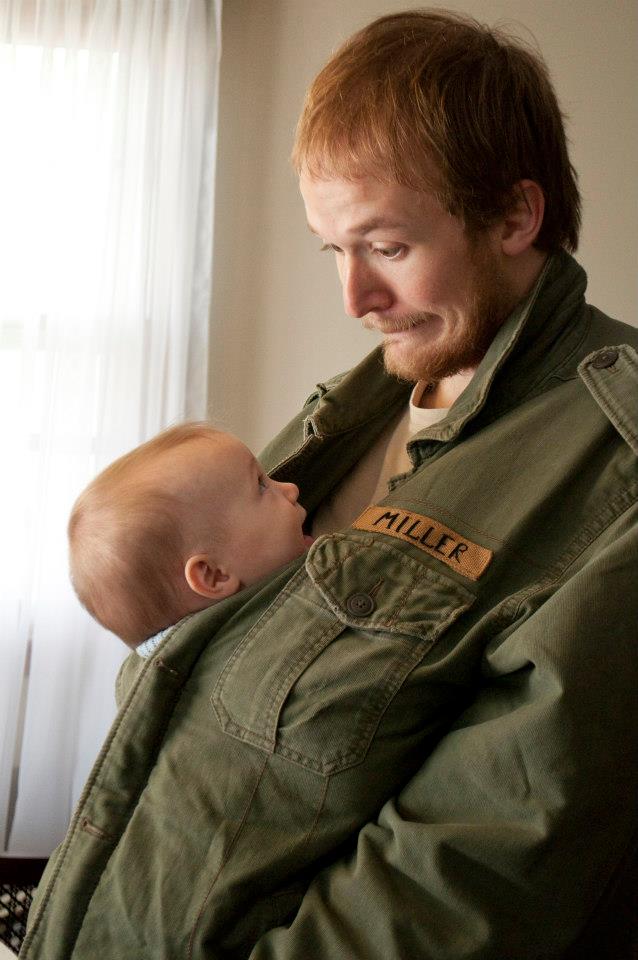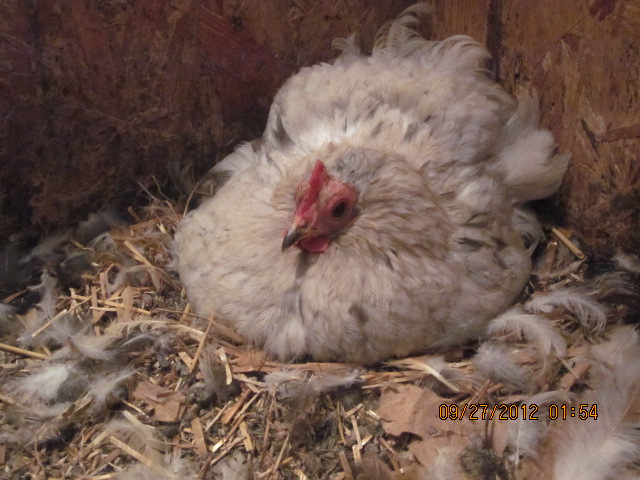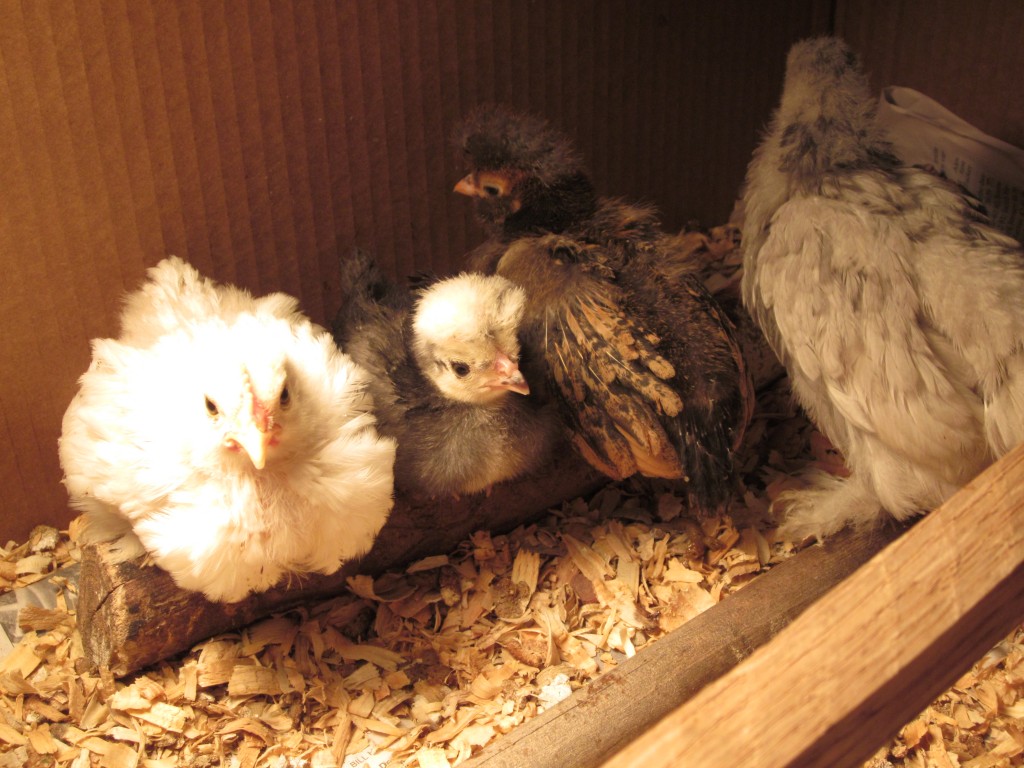It Was a Dark and Stormy Night . . . a Chicken Tale

I love Winter. She is an elegant, though remote, princess who comes to stay for a time, dressed all in white. I do not begrudge the Princess Winter her beauty, only her length of stay.
It’s the birthday of my son Andrew today, and in his honor I’m posting this story (in which he plays a heroic role.) Happy birthday, Andrew!

Here’s my son Andrew, playing with his little daughter Anya. (Photo credit to Sonia Miller) He’s a pretty cool Papa, as you can tell.
As winter drags on and flirts with breaking snowfall records, lowest temperature records, and the spirits of gardeners and all mothers with small children underfoot, I discover, increasingly, that I wake up in the mornings with a peculiar pain in my chest. It’s a persistent ache, with emotional roots. It washes over me at odd times during the day, too, for example when I’m looking at a seed catalog, or crunching through the snow to care for my chickens. The doctor can’t isolate the cause of the pain, but I know what it is: it’s Spring Fever, a good six weeks early.
Consider that the mere thought of the following brings it on: fresh cut green grass and warm southern breezes. Crocus and daffodils. The chortling of a flock of young bluebirds. My garden, freshly ’tilled. Ouch. I’ve got to stop. See, now you’re feeling it, too. My dad gave me a peculiar set of perfumes a few years ago, with the scents of Grass, Dirt, and Tomatoes. I pull them out this time of year and spray myself liberally with them, close my eyes, and dream—of luscious, heirloom tomatoes, handfuls of fresh green beans, crisp garden lettuce and loamy garden soil, ready for seeds and transplants. Ouch. There it goes again.

Remember these?
The thought of downy soft chicks brings on that ache, too, since we nearly always buy or hatch chicks in the early spring. A box full of fluffy chicks is a harbinger of spring at our place, just as much as the flying geese overhead or the tulip leaves poking through the snow. Sometimes we buy them–going from farm store to farm store, considering the various attributes of the breeds represented, and weighing our options. Laughing for no apparent reason, holding the little bits of fluff up to our cheeks and breathing in that sweet new chick smell. Pullets or straight-run? Should we even bother with roosters this year? We already have several. What about meat chickens? Should we raise some for the freezer this year, or just add to our flock of egg-layers?
Our mailbox is stuffed with tantalizing catalogs filled with beautiful pictures of chickens of every shape and color, and these I’ve pored over, too, trying to decide if I should add something exotic to our flock. The all-black chicken with the white spots would be fun. I’ve always liked the Speckled Sussex breed, too, with their calm disposition and dainty pink feet. And those English game chickens are so amusing, not much bigger than robins, and full of personality.
Other years, leaner years, we’ve tucked eggs under a couple of broody hens and hoped for the best. There are definitely advantages to this system: no boxful of delicate chicks in the house under a heat lamp, with my checking on their needs every few hours. No flying runs towards the door to intercept a cat. Mama hen does a remarkable job of hatching out and caring for her brood herself, with very little assistance from us, almost every time. That may be the way we go this year, since I’ve had four Buff Orpingtons that have been fighting me for their eggs all winter. Every morning I enter the chicken coop to pick up eggs and replace water and feed, and I prepare myself to be the most unpopular one in the place. Of course you remember the story of our little Babes, and her successful brooding last fall.

Hatching eggs is serious work that requires concentration. Here is Babes herself, concentrating on the Task At Hand.
There sit my four butterscotch-colored hens, doggedly, fiercely glaring at me, daring me—again—to just try and take their eggs. Just try it, raggedy woman–and you’ll see–!! As I carefully extricate the eggs out from under them with my gloved hands, I remind them, gently, that spring is coming—it is, ladies!!–and that a bitterly cold and snowy winter is not the smart chicken’s optimum time to hatch out delicate little chicks. But they just stare at me blankly, give me a couple of feeble pecks, and try valiantly to poke the eggs back under their downy breasts. Chickens are not deep thinkers. Still, I feel for them. They obviously are feeling the ache of Spring Fever, too, and there’s no cure for it except to let them try their hands (so to speak) at raising chicks, but they will have to wait until it’s warmer to do that.
I study these four little hens and try to decide which one might be a good mama. This is a hit-and-miss process, as you might imagine, quite unscientific and fraught with pitfalls.
Consider, if you will, the sad story of Ginger-the-Chick-Killer. Ginger was a beautiful ginger-colored (obviously) hen with a fierce personality. My chicken book says that if a hen fights you to keep her eggs, over and over again, rather than passively letting you remove the eggs out from under her, she just might be a good candidate for hatching out her own eggs.
Ginger was about the fiercest candidate for motherhood that I had ever seen. When I’d remove her eggs in the mornings, not only would she fight me, with indignant passion and violent pecks, but she’d raise a huge ruckus, as well, squawking and screeching long after I left the coop. I could hear her for a long time from the house, shrieking all sorts of abuse down onto my head.
“Will you look at what she DID? She STOLE MY EGGS! AGAIN!! She is a MEAN, selfish, hateful WOMAN! I HATE HER! Her mother wears ARMY BOOTS!!! I’m sure of it! Next time I see her I shall PECK HER EYES OUT! I shall! I SHAAAAALL! Murderer! MY EGGS! MY EGGGGGS!” That’s what it sounded like, pretty much.
From the house, the kids would shake their heads. There goes Ginger again. What a pill.
So, when spring came that particular year, I moved a clutch of freshly-laid eggs into the nursery of the chicken coop—a separate, narrow entrance-way which has been handy when the need to isolate chickens from the rest of the flock presents itself—and then carried a furious Ginger in and dropped her down on top of them. She shrieked and pouted, angry that I would dare to move her and her eggs without consulting her—what affrontery!!–but after stamping about and ranting and raving and squawking and shrieking, she did actually settle down on top of the eggs, eventually, grudgingly admiring her own personal heat lamp and fresh containers of water and food. Not that she showed even a modicum of gratitude, mind you.
I’ve had some experience with hopeful mama hens. Some will sit for a few days, and then give up, and join the regular flock. “What the heck. I guess those eggs are duds. Oh well, I’m tired of sitting inside, anyway. Lovely day outside. Hi, Lulabelle!” It takes a good 21 days of 24-hours-a-day sitting for eggs to hatch. Other hens will sit for a couple weeks, and then figure they deserve a day off. These flighty methods are fatal, of course, to a clutch of developing eggs. And by the time I discover the fickleness of the potential mama, it’s too late to rescue the eggs and put them under the incubator. At least I have yet to be successful at this particular type of search-and-rescue operation. Well, okay, one time it worked out beautifully and you can read about that here.

Here are a few chicks that we had in the house for a time.
But Ginger—characteristically fierce and protective—did a fine job of glaring at me any time I entered the coop, and calling down every curse in her limited vocabulary on my head. She certainly didn’t get up off those eggs, except for the briefest morning breakfast and stretch, as far as I could tell. I marked the calendar for her hatch-out day. My birthday! May 4. That would be just dandy, to have a new batch of chicks hatching out on my birthday! I cared for Ginger carefully, making sure she didn’t run out of food or fresh water, and hoped for the best.
So much of animal husbandry, in my experience, can be described in that phrase: “Hope for the best.”
The day before my birthday dawned darkish and stormy. A spring thunderstorm was brewing, which suited me just fine. Drama in the weather is always a welcome occurrence at our house, as long as the roof doesn’t get blown off. A birthday storm sounded like fun. Hatching chicks and a thunderstorm, all at once—what a promising day!
I braved Ginger’s wrath to check on her eggs several times throughout the day. They had achieved that pearly translucent look of successfully developing eggs, so I suspected that she had done a good job of incubating them. A couple of the eggs showed the tiniest of cracks, from the chick pushing from inside. I was excited and hopeful. Ginger, cantankerous personality notwithstanding, had done an excellent job of egg incubation, apparently. Within a day or two we’d see how she measured up as a mama.
It started raining in the late afternoon, and there was a hard rain coming down when I trudged out to the chicken coop to check on Ginger’s progress after supper that night. I was elated to see one little chick hatched out. My elation was dampened by the fact that the chick was not hidden carefully under Ginger, however, but was lying on its side several inches away from her. Usually a new mama will keep the new chicks carefully tucked underneath her as long as possible, for warmth and protection. Actually, every time I’d ever had a mama with chicks she had jealously kept them guarded underneath her . . . this was odd.
Dodging Ginger’s vicious attempts to maim me, as she pecked and squawked and flapped about, I carefully picked up the little chick. It was yellow and ginger striped, exquisite and perfect . . . except for a little gaping wound on its breast, where its little innards could be seen. I sat there in the dark coop, studying that little chick under the heat lamp, and puzzled over the dear little thing.
You know how it happens sometimes that the obvious answer to a thorny problem is right in front of you, but you miss it, anyway? This was one of those times. The answer for that wound was right in front of me, but the obvious explanation for it didn’t even occur to me at that moment. I just couldn’t fathom how that little wound had occurred, except to wonder if it was a birth defect of some sort. I decided to intervene, and carefully wrapped up that little chick in my mitten and ran to the house, getting soaked in the process. Once in the house, I gave the chick to one of the kids to hold while I dug out a heat lamp, a basket, and the necessary supplies to make a temporary incubator. I’d always wanted an incubator of my own, and now I really wished that I had bought one.
The little chick seemed perfect except for that little wound, so I tried to keep it warm and hoped that its little body would heal itself. Then, around bedtime I braved the elements one more time to check on the progress in the nursery.
CRASH! BOOM! RUMBLE! The storm was at its best now, with thunder crashing, lightning crackling across the dark sky, and buckets of rain dumping down on me as I ran back out to the coop, through the darkness and the mud.
I could just imagine the headlines in the local paper the next day “LOCAL WOMAN STRUCK BY LIGHTENING DURING EVENING CHICK CHECK!” The subtitle would read “Family buries woman in chicken yard. ‘She’d appreciate the irony,’ notes son.”
This time, the newly hatched chick was dead, lying again several inches out of the nest. Ginger sat, fierce and angry, guarding her remaining eggs, as I picked up the pathetic little thing, which had the same horrible wound on the chest as the first one. Realization—finally!—washed over me, and I burst into angry tears as it did. Ginger was intending to kill her chicks, one by one, as they hatched! The first one escaped, barely, but this second one didn’t. I felt sick as I sat there and stared at Ginger, the Chick-Killer, through my tears. So much for my mama hen-choosing abilities. I really messed up this time! I glared at Ginger, hissed some now-forgotten threats regarding what happens when a mama hurts her babies around our place, something involving homemade noodles, and then I raced back to the house for help. I carried the dead baby chick with me.
I am a fairly experienced farm-wife, but a dead baby of any sort always hits me pretty hard. I burst into the house, soaked and crying, the booming thunder and lightening adding drama to the scene. The kids clustered around me as I showed them the chick, then I hurried to the basket under the heat lamp, to check on the invalid, and to make room for the remaining eggs.
Meanwhile, unbidden, my passionate son Andrew and his sweet sister Bethany ran out into the storm, bringing back the remaining eggs carefully wrapped in Andrew’s bucket hat. “I threw Ginger out into the rain,” he said proudly. “Here are the rest of the eggs—two of them are starting to hatch.”
I’m so glad I checked on those eggs several times that day, and that I caught Ginger before she killed all her babies. My husband Bryan ran to Orscheln’s, our local farm store, the next morning and bought me a proper incubator for my birthday, in which the rest of the eggs hatched out successfully. Since it was my birthday, we named them appropriately . . . Happy, Birthday, Little Gift, Surprise, and Ice Cream. (No, I didn’t let the kids name a chick “Old.”) The little wounded chick didn’t make it, unfortunately, and we all felt sad when he died. My birthday chickens grew up devoid of the unstable personality of their mother, thank goodness, and they were lovely ginger-colored additions to my flock.
And I learned my lesson, once again, the hard way, as a Prairie Woman so often does. Never trust eggs to an angry, unstable hen. One could probably make a human parallel here, if one wanted to. By the way, later I read in my chicken books that sometimes a mentally unstable hen will—as her chicks hatch—view them as intruders and kill them, one by one. So that was it with Ginger. I haven’t had a hen like her since, thank goodness.
And she did make pretty good noodle soup. By the way, when you make your chicken and noodle soup, don’t skimp on the noodle factor. Homemade noodles are the best, and this recipe, happily is already on my blog. Enjoy!


One of the best father-daughter photos I’ve ever seen… Can’t get over it!
Stopping by from UBC! 🙂
Thanks for stopping by, Cham!
love your stories. don’t miss taking care of chickens during the winter.
(ugh) I’m with you! But spring is coming!
Oh Amy, I truly loved reading your post. I gave my youngest sister some silkies and frizzle hens. They haven’t stopped producing chickens since and there always seemed to be at least one ‘rescue mission’ each round. Especially when I’ve come home for a weekend and the sister is away 🙂 Thanks for sharing! Caylie
Caylie, thanks for reading! I’ll try to get in your post, too, later today!
Wow, Amy! What a cool chick rescue story! When I lived on a farm back in my adolescent years, we had lots of chickens and we had a slew of hens that would lay. There was always a mean one in the bunch. Most of the time, they would just lay eggs. There was one or two that would set and incubate the eggs. I think we even had one that laid on a goose egg which hatched too. If I remember correctly, we named it Buttercup!
Thanks for sharing this story. This is the kind of material I like to read. Wish I could have chickens where I’m at, but I live in a neighborhood that has rules! LOL
Aw. Dumb ole’ rules. Thanks for reading, Aletha!
Your post had me gripped from beginning to end – I had no idea that hens could react like that! I have never kept chickens but I did live near a farm and meadows when I was a child. I would find lots of injured wildlife and tend it with such care in a shoebox. Most of my patients died of course – I used to be terribly upset…
Karen,
I hear you! I used to try to save every ailing creature I came upon when I was a little girl, and it broke my heart many times! Now I’m a bit tougher, but just a tiny bit. Thanks for reading!
What an amazing story. It’s easy to understand why mama Ginger made such good soup and how easy that decision would be to make in that circumstance.
I agree there might be a correlation to human mama’s, however, having been the mentally unstable mama hen, I’m sure my chicks might have been better off with a more stable foster mama, but none were readily available. We’re working through it and they made it to adulthood. They are excellent and gorgeous specimens I’m grateful and proud to have been able to raise. The good thing about human being is that process of parenting can transform us and we have the opportunity to change, with help and support.
I really enjoyed your story and the descriptions. For a born and bred city girl with very little domestic education in home-making, much less homesteading, this is fascinating and informative. Thanks for sharing.
Kina, Thanks so much for reading. It sounds like you did a wonderful job with your “beautiful specimens” despite some challenges. I’m glad you enjoyed my story.
I also love the photo of your son and his daughter. So precious.
As for the chicks, my favorite project in sophomore biology class was when we were assigned chicken eggs to raise from egg to chick. It was the most difficult and rewarding project we did all year. I can’t imagine doing it year after year, my hat’s off to you.
Happy 16th day of UBC!!! 🙂
Happy 16th UBC day to you, Lizze, and I appreciate your reading my story! I’ll look for your post tomorrow!
Great story, especially since I am the hero of the story. 😉
Have you read The Book of the Dun Cow? You should. Your writing reminds me of that story.
(…darn Ginger)
No, Andrew, I’ve never read it, but I remember you and Matthew both carrying it around with you. I wonder if there is still a copy around here? I’ll have to add it to my reading list. Thanks for reading (and happy birthday!).
I have been thinking of getting hens….this is encouraging me in that direction! Great stories!
Well, Melinda, that’s one thing about having chickens . . . you are always loaded with story-telling material! Thanks for reading!
A great story! Drama! Conflict! Intrigue! And a (semi) happy ending. I’ll take your words to heart and never trust a cantankerous chicken again!
Mollie, it’s so nice to have you back. Thanks for reading my story!